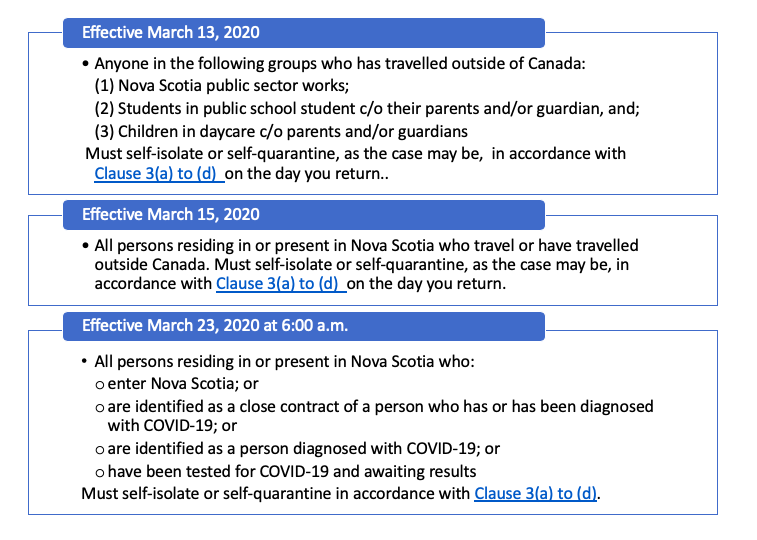The COVID-19 pandemic raises significant workplace issues. One of them is when may an employer lawfully send employees home.
Employers should proactively adopt flexible measures that help keep employees and their communities healthy and working. For example, where possible, employers should allow employees to work remotely. The Nova Scotia Government calls upon employers to talk with their employees about flexible hours or alternative work arrangements if they are required to stay home.
Where is it not possible for an employer to have employees work from home, the employer may require an employee to stay home from work in order to fulfill a government directive or to comply with the employer’s occupational health and safety obligations.
Government Directives:
Employers must ensure they follow all government directives and orders.
Under s.14 of the Emergency Management Act (EMA), the Minister has broad powers to “do everything necessary for the protection of property and the health or safety of persons therein.” Measures include but are not limited to actions listed under s.14 (a) to (m) of the Act.
The Health Protection Act (HPA) empowers Medical Officers to issue orders directing individuals take or refrain from actions in respect of a communicable disease.
On March 23, 2020, the Chief Medical Officer issued a written Order that provides details about who must self-isolate or self-quarantine. The Order also clarifies what self-isolation and self-quarantine involve and who is exempt from such measures.
Here is an up-to-date summary of those required to self-isolate or self-quarantine in accordance with Clause 3(a) to (d) of the Order:

Government orders and directives requiring individuals to self-isolate or self-quarantine must be obeyed. Employers must require any employee ordered to self-isolate or self-quarantine to remain at home.
COVID-19 is an ongoing and developing situation. Employers should remain alert to measures implemented under the Emergency Management Act and orders made under the HPA.
Occupational Health and Safety:
Under the Nova Scotia Occupational Health and Safety Act (OHSA), employers must “take every precaution that is reasonable in the circumstances to… ensure the health and safety of persons at or near the workplace.” If an employer reasonably believes that the presence of an employee at work poses a health risk to other employees or the public, the employer may require the employee to stay home.
It is imperative that employers not engage in discriminatory practices. Ethnicity and nationality are not bases on which an employer can reasonably believe an employee might be a health risk.
Do Employers have to pay employees that are sent home?
Whether an employer must pay employees who are sent home due to a public health directive or occupational health and safety concern will depend on the individual circumstances of each case.
There may be rights and obligations in the relevant employment contract or collective agreement that require an employer to pay an employee who is sent home. An employee who contracts COVID-19 should have access to whatever paid leave they would be able to access for any other illness that prevents them from going to work. The Labour Standards Code (Code) entitles employees to 3 annual days of unpaid sick leave.
As a best practice, given the current circumstances, an employee who must self-isolate because of travel should be permitted to access other paid leaves that are available if paid sick leave is not available to them.
Employers should consider the potential reputational impact of holding employees out of work without compensation, as well as the potential unintended consequence of employees coming to work despite direction not to, given that they will not receive pay while they are home.
For further information about workplace issues relating to COVID-19, contact us at (902) 423-7777, toll-free at 1-800-565-4529, or [email protected].
* This information is not legal advice. The answers to these questions will vary, depending on the circumstances of each case. Consult legal counsel for information and advice relevant to your individual circumstances.
